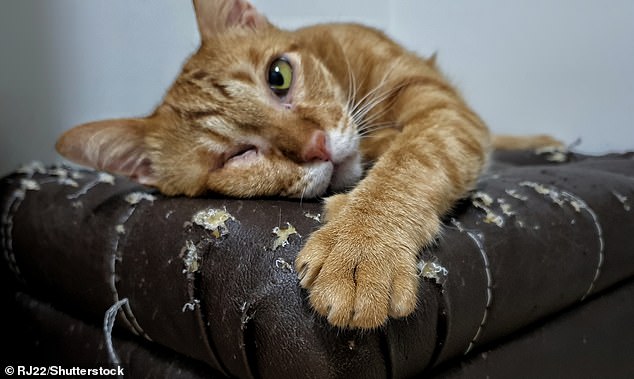Revealed: The Triggers That Make Cats Scratch Your Furniture, According to Scientists
- Stress, children and nighttime activities can cause your cat to scratch the couch
- READ MORE: Mutant Moggy? Genetic Mutation Gives Cats Unusual Coat
Most cat owners are familiar with the torn cushions, carpets and couches that come with cats.
But cats’ scratching instincts are heightened by stress, a study shows, and young children are one of the biggest triggers.
An international team of researchers investigated which factors influence unwanted scratching behavior in domestic cats.
The team from the University of Ankara in Turkey surveyed more than 1,200 cat owners in France about the daily lives and characteristics – and any unwanted scratching behaviour – of their furry companions.
They found that the presence of children in the home, as well as a lot of play and nighttime activity, contributed significantly to an increase in scratching.
From the presence of children to nighttime activity, there are many factors that cause your cat to scratch your furniture, scientists say
Lead researcher Dr Yasemin Salgirli from Ankara University told MailOnline: ‘“Nocturnal activity” in cats involves behaviours displayed at night.
‘Nocturnal behaviors, such as increased playfulness and vocalization, often result from insufficient stimulation or social interaction during the day and may also be a form of attention seeking.
‘Cats are nocturnal by nature, but they can adapt to human circadian rhythms if they are provided with structured and fun activities during the day.’
But stress turned out to be an important reason for the unwanted behavior, the researchers said.
According to the team, the presence of children, especially when they are young, can increase stress and be one of the reasons why cats become sensitive to stress.
Another factor that can also be related to stress is playfulness: when cats play for long periods of time, their stress levels can increase due to the uninterrupted stimulation.
Cats described as aggressive or disruptive also showed more scratching behavior.
The team recommended placing scratching posts in areas where cats often pass by or near their favourite resting spots, which can help reduce scratching on furniture.

Cats that scratch furniture can frustrate their owners, but this normal feline behavior can be addressed by modifying play sessions and placing scratching posts in appropriate places, researchers have found.
Multiple short play sessions that mimic successful hunting scenarios can maintain cats’ interest and reduce stress, they added.
Dr Salgirli adds: ‘Here we show that certain factors – such as the presence of children at home, personality traits of cats and their activity level – have a significant influence on the extent of scratching behaviour.
‘Our findings can help caregivers manage and redirect scratching behavior to appropriate materials, which can contribute to a more harmonious living environment for both cats and their caregivers.
‘Providing safe hiding places, elevated observation areas and ample play opportunities can also help reduce stress and encourage the cat to engage in more constructive activities.’
The findings were published in the journal Frontiers in veterinary medicine.
